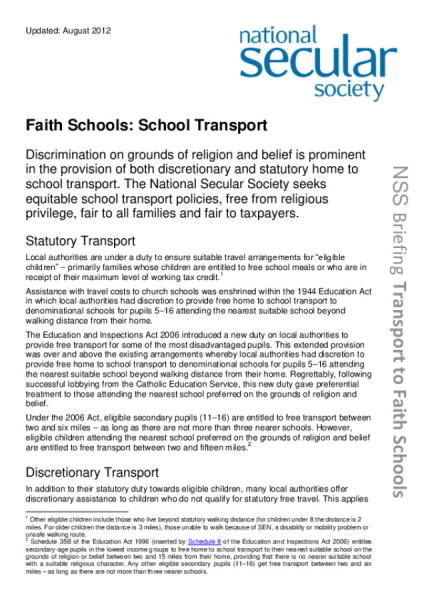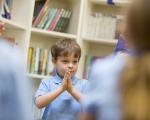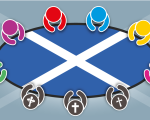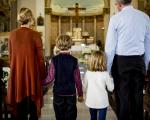Transport to faith schools
Discrimination on grounds of religion and belief is prominent in the provision of both discretionary and statutory home to school transport. We seek equitable school transport policies, free from religious privilege, fair to all families and fair to taxpayers.
 Faith Schools Transport Briefing Paper (PDF, 222 Kb)
Faith Schools Transport Briefing Paper (PDF, 222 Kb)
Related news
Edinburgh Council ends religious reps’ voting powers
Posted: Thu, 31 Aug 2023 13:53
Decision to end voting privileges for unelected religious appointees at City of Edinburgh Council welcomed by NSS
Faith schools repeatedly refuse to teach about same sex relationships
Posted: Thu, 27 Jul 2023 11:45
Three independent faith schools are refusing to teach about same sex relationships despite previous criticisms from inspectors.
According to Ofsted reports published this month, three Jewish faith schools in London have failed to meet independent school standards because they do not teach the required content in relationships and sex education (RSE).
Leaders at Beis Trana Girls' School told Ofsted they "do not intend to teach pupils about the legal rights and responsibilities" regarding equality.
Although statutory guidance for the RSE curriculum mandates teaching about the protected characteristics in the Equality Act 2010 - including sexual orientation and religion and belief -. orthodox Jewish faith schools frequently refuse to teach about protected characteristics due to religious objections to same sex relationships.
Pupils at Beis Trana are not "taught about all the ways that people can be different" and how these differences are protected by law. Ofsted said that as a result of the school's approach, pupils "were not being prepared for life in modern Britain".
This latest inspection at Beis Trana follows a full inspection in 2022, which rated the school "inadequate". The 2022 inspection noted secondary school age pupils "are not taught about the different types of relationships that people may have and the legal rights of those with protected characteristics".
Beis Trana has not received a rating above "requires improvement" since 2014.
Meanwhile, Ofsted found that leaders at Shiras Devorah High School continue to omit "any encouragement of respect for other people" with particular regard to the protected characteristics of "sexual orientation, civil partnership or gender reassignment".
The school's leadership did not explain how they intend "to encourage pupils to respect others". No changes have been made to the RSE curriculum since the school's previous inspection in 2019, when it was found to "not permit reference to all of the protected characteristics" set out in the Equality Act.
At both Beis Trana and Shiras Devorah, school leaders told Ofsted inspectors not to speak to pupils about relationships and sex education. They also confirmed their refusal to teach about sexual orientation and other protected characteristics was due to their faith ethos and parents' wishes.
In another report, Ofsted said leaders at Bnei Zion Community School were "still not providing pupils with an understanding of differences in modern British society", including the protected characteristics. Bnei Zion has been judged to be 'inadequate' since 2016, when Ofsted similarly found pupils were "not given opportunities to learn about people of other faiths or those of none, or about different lifestyles and values".
Although new plans had been drawn up for personal, social, health and economic (PSHE) education, they did not "accurately reflect what is taught", or include "what pupils need to know" and what they should be taught about "other religions, faiths, beliefs and cultures".
The school also prevented inspectors from asking pupils anything about "sex, sexual orientation, civil partnership or gender reassignment".
Ofsted said the school is continuing to breach its registration agreement by admitting 172 pupils between the ages of three and 11. The school is registered to admit up to 200 pupils between the ages of three and five only.
NSS: 'Disregard for RSE shows contempt for the law'
Jack Rivington, campaigns officer at the National Secular Society, said: "Ofsted has repeatedly found Beis Trana, Shiras Devorah, and Bnei Zion refusing to teach about different kinds of people and relationships due to religious concerns.
"As well as failing to fully prepare students for life in Britain, this repeated flagrant disregard for legal requirements show contempt for Ofsted and the independent school standards.
"For a school to openly admit it has no intention of following the regulations is unacceptable. Ofsted must be sufficiently empowered to deal with schools that flout the law in this way, whatever their religious ethos".
NSS: Don’t let Welsh independent schools put faith before education
Posted: Wed, 12 Jul 2023 14:24
The National Secular Society has told the Welsh Government independent schools should not omit education which conflicts with religious teachings.
Responding to a consultation on proposed changes to standards for independent schools in Wales, the NSS warned that allowing the teaching of personal, social, health and economic education (PSHE) in a manner that reflects a "school's aims and ethos" could lead to faith schools not teaching about protected characteristics set out in the Equality Act 2010.
The NSS welcomed provisions in the proposed changes which would require a curriculum which "encourages respect for other people", with particular regard for the protected characteristics set out in the act. These include religion or belief, sex, and sexual orientation.
But they also highlighted that independent faith schools in England frequently fail to teach about same-sex relationships or people of different religions and beliefs, or teach discriminatory ideas about them.
As recent figures from England's Department for Education revealed, independent schools with a faith ethos are four times more likely to be issued warning notices than their non-religiously affiliated counterparts, with many judged to be of an unacceptable standard because they fail to teach aspects of PSHE which are perceived to contradict the school's faith ethos.
Examples from 2023 alone include:
- Ateres Girls High School, which fails to teach about "sexual orientation, different types of stable relationships and vocabulary such as consent and the implications of this word".
- Bnois Jerusalem Girls School, where the school's proprietors forbid "any coverage of different religions, faiths and beliefs" and where respect for others, including those with protected characteristics in the Equality Act 2010, is not encouraged.
- Bournemouth Christian School, which presents a Christian perspective as "more important than scientific fact" and fails to provide appropriate relationships and sex education (RSE).
The NSS also drew attention to its own Unsafe Sex Education report from 2018, which uncovered RSE policies from state-funded faith schools in England that explicitly denigrated same-sex relationships.
The NSS said that the Welsh Government's proposed curriculum changes allowing PSHE which "reflects the school's aims and ethos" could create a similar situation in Wales.
The NSS also raised concerns that, under the proposed changes, 'partisan political views' could be given a free pass when they have a religious basis. The proposals would preclude the promotion of such views in teaching or require that when political views are discussed, a balanced view is presented.
In its Unsafe Sex Education report, the NSS found many faith schools delegitimised same-sex marriages by describing marriage solely in terms of being 'between man and woman', with one stipulating that "treating alternative relationships as equivalent to marriage" was "contrary to the school's ethos".
Other faith schools were found to explicitly teach that contraception and abortion are morally wrong.
The NSS argued that these perspectives are fundamentally political and, as such, should not be excluded from the restrictions simply due to their faith-based character.
NSS: 'Faith ethos is no excuse for avoiding educational obligations'
Jack Rivington, campaigns officer at the NSS, said: "We welcome the proposed changes to the regulations for independent schools in Wales, which will bring requirements largely in line with England and help to promote respect for the protected characteristics set out in the Equality Act.
"However, the Welsh Government must ensure that the regulations do not contain loopholes which can be exploited by faith institutions to avoid teaching full and impartial RSE and PSHE curriculums, or to present biased political perspectives without context.
"All children are entitled to high-quality, age-appropriate RSE, whatever kind of school they attend. It is vital that the wording of these proposed changes guarantees that provision and protects against religious attempts to circumvent it."
Church plans to use schools to drive conversion of children
Posted: Tue, 4 Jul 2023 12:04
The Church of England has unveiled plans to use schools to drive recruitment of children and young people to Christianity.
In a document published on Friday, the Church said "courageous structural shifts in thinking and practice in education" will "contribute to the Church's vision to double the number of children and young people who are active Christian disciples by 2030".
The Church, which is embroiled in safeguarding scandals, has seen a dramatic decrease in membership, particularly among young people. The 2019 British Social Attitudes survey found just one per cent of 18-24 year olds in Britain belong to the CofE. Overall, less than 1% of adults in England regularly attend CofE services.
Education "central to the mission of the wider diocese"
The document recommends government leaders "further deepen the mutual partnership between church and state, at national, regional and local level, to enable the ongoing flourishing of church schools for coming generations".
It calls for dioceses to "provide an ambitious and expansive vision" for the role of the Church in education. This includes "the creation of new models of church in schools, which provide opportunities for children and adults to develop their journey of faith, through well planned pathways to discipleship".
"By creating and embedding strategic partnerships between churches and schools across the diocese, children, young people and their families can have the opportunity to grow in faith," it says.
It says diocesan leaders should ensure education is "central to the mission of the wider diocese", and should pay particular regard to religious education and collective worship.
The document says the Church's vision for education is "not just for Church schools" and that the Church will "continue to embrace vibrant partnerships with all major education institutions".
It adds that the Church "has a particular responsibility" to "safeguard the distinctive vision of its schools".
It also says school trust leaders should "celebrate equity, diversity, belonging, inclusion and justice". But many Church of England schools' admissions policies discriminate against children whose families do not belong to the Church. Research in 217 found one in four dioceses advise their schools to reserve some places on faith grounds. In 2013, the Fair Admissions Campaign found Church of England comprehensives whose admissions criteria allow full selection of faith admit 35% fewer children eligible for free school meals.
The Church has also been criticised recently for its homophobic and sexist policies.
Last month the UN Committee on the Rights of the Child (CRC) urged the UK to repeal compulsory collective worship laws and end the religious selection practised in faith schools.
NSS: 'Church regards our schools as mission fields'
National Secular Society head of campaigns Megan Manson said: "The Church has made it clear that it regards our education system as a mission field. Its latest plans reveal it wants to cynically use the state education system, which citizens of all faiths and beliefs pay for, to boost its plunging membership figures.
"Its desire to form even deeper links to the state can only further undermine secular democracy.
"These plans are highly inappropriate in such a diverse society, where Christians are now a minority.
"The government should stop giving the Church a free hand to pursue its own self-serving agenda in publicly funded schools. The purpose of such schools should be to educate, rather than inculcate pupils into a particular faith.
"And it should work separate Church and state rather than further entrench these ties."
Faith school found teaching Bible as fact in history and science
Posted: Thu, 29 Jun 2023 09:33
An independent school has failed an inspection after it was found teaching the Bible "as fact" in subjects including science and history.
Bournemouth Christian School was judged "inadequate" by Ofsted after inspectors found multiple failings at the school during an inspection in April.
In a report published this month, Ofsted said the school's leaders have established a curriculum that presents "flawed and inaccurate information in all subjects", with pupils learning through an "unmoderated Christian worldview".
This includes presenting a Christian perspective as "more important than scientific fact", and failing to provide a "balanced, factually accurate curriculum". Ofsted said that this impedes pupils' understanding, and that they consequently do not gain the knowledge necessary for their futures.
Pupils "do not learn much about the world around them", including "citizenship in modern Britain", Ofsted said. It added that the curriculum's "focus on America" does not help pupils "prepare for life in modern Britain" or beyond school. This includes a focus on "the American literary tradition", which means pupils "do not learn about the literary traditions that have shaped the United Kingdom".
The school also fails to provide an effective personal, social and health education programme for students, including appropriate relationships and sex education.
The school, which teaches pupils between ages 3 and 18, uses the online curriculum of SwitchedOn Education. SwitchedOn Education describes itself as providing a "Christian digital education curriculum" for both "schools and home schools" in the UK and internationally.
Ofsted found teachers "do not have the subject knowledge to support pupils effectively" and are unaware of what pupils do or do not know, with pupils interacting "mainly with computers".
Ofsted said the school has also failed to "create an effective culture of safeguarding", with pupils at a "serious risk of harm". Leaders do not address concerns about pupils or ensure that pupils were safe in school. The school site was found to be insecure, with pupils easily able to leave.
NSS: School "more interested in indoctrinating its pupils than educating them"
National Secular Society campaigns officer Jack Rivington said: "This damning report from Ofsted reveals an organisation more interested in indoctrinating its pupils than educating them.
"The presentation of religious dogma as more valid and more important than scientific fact is unacceptable, and deprives children of their full right to an education.
"The appalling quality of Bournemouth Christian School's curriculum, teaching methods, and safeguarding processes revealed in this report is highly concerning. This school should now receive further scrutiny to ensure children and young people's rights are protected."
Fife Council ends voting powers for religious appointees
Posted: Thu, 22 Jun 2023 12:51
Fife Council has become the third Scottish council this year to end voting privileges for unelected religious appointees.
The National Secular Society welcomed Fife Council's decision to end voting concessions for the religious representatives sitting on the cabinet and education committees.
Councillors voted 36 to 32 in favour of removing their voting privileges in a full council meeting today.
The NSS and local humanists briefed councillors ahead of the meeting, urging them to strip religious representatives of voting privileges. The NSS said no one should be granted "a privileged place in local democracy just because of their religion".
The Local Government (Scotland) Act 1973 obliges local authorities in Scotland to appoint three religious representatives to their education committees, at least one of whom must be appointed by the Roman Catholic Church and one by the Protestant Church of Scotland.
Such representatives have voting privileges in most councils, enabling them to influence local education policies affecting both faith and non-faith schools. At Fife Council, they are the only unelected members granted such concessions.
A motion was originally brought forward by Liberal Democrat councillors in 2022 aiming to consider a fair and democratic solution to managing religious representatives. Labour proposed a vote to maintain their voting powers and review again in 2027. The motion was amended by the Scottish National Party Cllr David Barratt to remove their votes entirely.
Following the vote, Lib Dem councillor Al Clark said: "Whilst we respect that religious reps can have an opinion, it is undemocratic for them to express a vote that could have an impact on the education of our children.
"They are not accountable, unlike elected members who are voted to represent our communities".
The Church of Scotland's own former representative in Fife, Brian Blanchflower, also supported the motion, saying voting is for democratically elected members.
Fife is particularly nonreligious. In the 2011 census, those with no religion were the largest religion or belief group, at over 46% (the Scottish average was nearly 37%). Approximately 31% of people in Fife were Church of Scotland and 9% were Roman Catholic.
The most recently available Scottish Social Attitudes Survey data shows 58% of Scots (including 74% of 18–34s) have no religion.
The legal requirement for Scottish councils to appoint religious representatives is being increasingly challenged by local authorities. In 2019 Perth and Kinross Council became the first to strip them of voting privileges. Following campaigning from the NSS and others, Moray Council and Scottish Borders Council followed suit. In May, Orkney Council and Highland Council voted to remove voting privileges for religious reps.
Scotland's former Education Secretary Shirley-Anne Somerville MSP has told the NSS there are "no plans" to end places for religious appointees on education committees.
NSS: 'We hope other councils follow suit'
Head of campaigns Megan Manson said: "It's fantastic that Fife has become the latest council to end the unfair voting privileges granted to religious representatives.
"They are now the third Scottish council within the past two months to make this move. Momentum is clearly gathering across Scotland as more councillors realise that giving unelected religious appointees a vote is undemocratic and unequal.
"The Scottish government should take notice of the growing unpopularity of religious reps and work to revoke the law that requires them on councils in the first place."
Faith schools foster unfairness and discrimination
Posted: Tue, 20 Jun 2023 15:15
Fairness and freedom should be central to state education. Recommendations from the UN child rights committee lay bare faith schools' failings, argues Stephen Evans.
On any given Sunday countless numbers of nonbelievers dutifully trapse off to church, not in search of sermons or salvation, but school places.
The bizarre phenomenon of parents attending church to secure a place at their local school stems from around a third of state funded schools being faith schools. Many of these may, when oversubscribed, give preferential treatment to children from families deemed sufficiently pious.
Faith-based admissions exist to ensure religious organisations running state schools can 'serve their own'. But the system also benefits the 'pew-jumping' middle class, who are willing and able to game the system by feigning faith to gain a place in a sought-after selective school.
It's often claimed that church schools deliver better academic outcomes. But the evidence shows that any educational advantages are small and are explained by factors around pupil intakes, such as religiously selective admissions arrangements.
Religious selection acts as a form of socioeconomic selection – and it's this, rather than a religious ethos, which compels many middle class parents to turn up at church to gain a place at a well performing school, without paying for a place at a private school. 'On your knees, avoid the fees', as the saying goes.
One such parent who admitted to doing this appeared on a local BBC radio debate I took part in last weekend. He explained that, unsatisfied with the schools in his catchment area, and unable to avoid private school fees, he attended services at an evangelical church once a month for five years to gain the necessary 'points' for a school place. He stopped going the moment his child's application was submitted.
That parents are willing to jump through such hoops to get their child into a particular school is a sad reflection on our state school system. Ideally, all children would have access to a good local school. By siphoning off the children from wealthier families at the expense of the rest, faith schools exacerbate the attainment gap between non-selective and selective education.
Gaming the system may be morally dubious, but rather than blame parents, we should reserve our indignation for a system that allows taxpayer funded schools to operate discriminatory admissions and select pupils on religious grounds.
The Equality Act exemptions that allow faith schools to give preferential treatment to worshippers legitimises faith-based discrimination. Thirteen years after the passing of landmark legislation to protect people from unfair treatment, religion's influence in state education is ensuring 19th century-style religious discrimination remains a feature of 21st century schooling.
Making religious leaders the gatekeepers to publicly funded services has other unintended consequences, too.
Whilst Church of England and Catholic schools usually require church attendance to gain the school's blessing, religious requirements in the oversubscription criteria of some minority faith schools' policies impose extreme religious ideology on families.
National Secular Society research revealed how some religious authorities use faith-based admission requirements to control how their students' families dress, whether they can use the internet, what they can eat, and even when they have sex.
Surely, it's time to consign this form of discrimination to history.
The UN Committee on the Rights of the Child (CRC) certainly thinks so. In its concluding observations to its latest periodic examination of child rights in the UK, the CRC called on the UK to guarantee the right of all children to freedom of expression and to practise freely their religion or belief, including by repealing archaic school worship laws and preventing the use of religion as a selection criterion for school admissions.
Those campaigning for a fairer and more inclusive school system often ignore faith schools and focus instead on grammar schools. The government has admitted it does not know how many schools apply religious discrimination in their admissions. But it's clear that far more school places in England are subject to religious selection than academic selection. So, if you want to achieve a fairer and more inclusive education system, faith schools are the obvious place to start.
That means standing up to entrenched religious interests by insisting the schools we all pay for are open equally to all children, without regard to religion or belief – and that they respect and protect all their pupils' freedom of religion or belief.
Despite the lack of evidence that faith schools do this any better than other schools, faith school enthusiasts like to wax lyrical about the values they instil in children – honesty, kindness, compassion, justice. But the values they actually entrench in society are privilege, unfairness, and discrimination.
One Conservative MP characterised the UN's recommendations as "intolerant" and an "attack on people and institutions of faith". Vested interests lined up to echo those sentiments. But tackling human rights violations and discrimination takes aim not at religion, but at the negatives that flow from organising public services around it.
A pluralist society should both tolerate and celebrate all forms of diversity, but that diversity should be represented within schools, not be a marker of division and a basis for educating and segregating children.
Adopting the UN child rights committee's recommendations would go a long way to putting things right.
Image: Rawpixel.com, Shutterstock
NSS welcomes calls for objective RSE in N. Ireland
Posted: Wed, 14 Jun 2023 14:12
The National Secular Society has said relationships and sex education (RSE) at faith schools needs reviewing across the UK, following a critical report on RSE in Northern Ireland.
The report, published this week by the Northern Ireland Human Rights Commission (NIHRC), highlighted that many post-primary schools in NI are failing to uphold children's rights because they teach stigmatising ideas about contraception, abortion and homosexuality.
The NSS said similar issues exist across the UK. In 2018, it published a report which found many faith schools explicitly teach that same-sex relationships, sex outside of marriage, contraceptives and abortion are morally wrong.
Homosexual acts "against the nature" of human relationships, says NI school
In its survey of post-primary schools in NI, the NIHRC found some schools present the Catholic teaching that "the use of any artificial means of preventing procreation is not acceptable". The NIHRC said teaching young people that contraception is wrong "contradicts risk-reduction approaches to youth sexual activity".
The research found most respondents do not mention "abortion" in their RSE policies. The majority of those that do reference "pro-life values" such as "right to life" and "precious life". Twelve per cent of respondents teach abortion according to the "biblical principles of the sanctity of life" and "the Christian ethos".
Although most schools condemn discrimination against LGBT people and claim to uphold inclusivity and diversity, schools "often contradicted these values in various ways", the NIHRC said. A third of schools explicitly teach heterosexual relationships are the "main" or "ideal" context for sexual intimacy, including one school which says it is "the most desirable option for a person's psychological development".
Some schools say homosexuality is wrong, including one which states "the belief that homosexual acts are against the nature and purpose of human relationships will be presented to pupils".
The report said most schools promoted abstinence, some specifically until marriage. Over 95% promoted the value of the "sanctity of marriage".
In NI, RSE must be taught "in harmony with the ethos of the school and reflect the moral and religious principles held by parents and school management authorities". The NIHRC found nearly 97% of schools made reference to their "ethos", "morals" or "values" in their RSE policies.
The United Nations Committee on the Elimination of All Forms of Discrimination Against Women (CEDAW) has made a recommendation to the UK government to "make age appropriate, comprehensive and scientifically accurate education on sexual and reproductive health and rights a compulsory component of curriculum for young people, covering prevention of early pregnancy and access to abortion, and monitor its implementation."
The NIHRC said the legal and policy framework for RSE is not sufficient to ensure RSE meets this requirement. It recommended the law be reformed to require schools to teach RSE which complies with CEDAW recommendations.
Last week, Northern Ireland Secretary Chris Heaton-Harris laid new regulations before parliament to make it compulsory for all post-primary schools in NI to teach pupils about access to abortion and preventing pregnancy.
The statement was criticised by the moderator of the Presbyterian Church in Ireland, Dr John Kirkpatrick, who accused Heaton-Harris of trying to "impose a particular worldview on the education of children in Northern Ireland".
NSS: Government 'must stop letting faith schools teach RSE through a faith lens'
In England, faith schools are permitted to "teach the distinctive faith perspective on relationships", and at all schools "the religious background of all pupils must be taken into account" when teaching RSE.
The NSS has criticised this guidance after its research found faith schools which call homosexuality "disordered", contraceptives "intrinsically evil" and abortion "the killing of an unborn child, an act of taking a human life".
The NSS identified similar problems at faith schools in Scotland and Wales.
In March, the government announced it would review RSE provision. Although the NSS called for faith-based RSE to be included in review, this is not specifically mentioned in the review's terms of reference. The NSS also expressed concerns about the religious connections of individuals appointed to the review panel.
NSS head of campaigns Megan Manson said: "The Northern Ireland Human Rights Commission's findings echo our own from Britain: faith-based distortion of RSE is widespread.
"While making lessons about abortion and contraception compulsory is a positive step, it will not stop schools from teaching stigmatising and discriminatory ideas about sex and relationships if schools are permitted to teach according to a faith ethos.
"If the government is serious about ensuring every young person is given objective, evidence-based and inclusive RSE, it must stop letting schools deliver the subject through a faith lens."
Image: Shutterstock
NSS raises concerns over RSE review panel members
Posted: Wed, 7 Jun 2023 12:09
The National Secular Society has raised concerns over the religious connections of individuals appointed to review relationship and sex education.
One member is a former director of a Christian charity that opposes LGBT rights and access to abortion. Another oversees an academy trust where relationship and sex education (RSE) is taught in line with Islamic religious beliefs.
RSE review
In March, the government announced it would review the RSE curriculum in schools. The announcement followed allegations, spearheaded by Miriam Cates MP, that children were being exposed to sexually inappropriate content in RSE lessons. The National Association of Head Teachers has suggested the review may be "politically motivated".
The review is being carried out by the Department for Education and is to be guided by a five-strong "expert panel".
Alasdair Henderson
One panellist, barrister Alasdair Henderson (pictured, left), was a director of the charity the Lawyers' Christian Fellowship (LCF) from 2016 to 2021.
In a policy paper entitled 'Marriage and the Public Good', the LCF rejects gay sex because "God has designed intercourse as a meaningful act of communication because its purpose is to join a husband and wife together for life".
It also suggests that children brought up in heterosexual marriages "live according to higher standards of integrity and moral principles".
An academic paper hosted on the LCF website compares opposing same-sex marriage to opposing incestuous marriage between close relatives. It adds that allowing same-sex marriage "will undermine the 'moral weight of marriage'".
A lecture hosted on the LCF website refers to abortion law in the UK as "unjust". In 2018, Mr Henderson represented a Christian client who opposed a buffer zone around an abortion clinic in London.
In 2006, the LCF opposed government efforts to introduce legislation that would ensure LGBT people could not be denied services on the basis of their sexuality. The LCF urged Christians to write to their MPs to ask for a religious exemption to the legislation.
The LCF's former public policy officer was Andrea Williams, who is now Chief Executive of the Christian Legal Centre and Christian Concern. In a Channel 4 documentary, while still at LCF, Ms Williams describes abortion in the UK as a "silent holocaust" that is the work of "Satan".
Hamid Patel
Another panellist is Hamid Patel (pictured, right), chief executive of the Star Academies trust and a board member of Ofsted.
Star Academies, formerly known as Tauheedul Education Trust, operates 31 schools. Most of these are Islamic faith schools.
The Star Academies uniform policy for girls' faith schools says hijab (a headscarf) "is part of the Uniform", although pupils may opt out of wearing it due to "individual values or cultural or faith sensitivities". The hijab is mandated in some Islamic countries, such as Iran, to impose Islamic modesty codes on women.
The trust also states that its schools with an Islamic faith designation will "teach the distinctive faith perspective on relationships and sex education alongside the teaching of each topic or theme".
A 2018 National Secular Society report, Unsafe Sex Education, found many faith schools teach that homosexual acts are wrong and that homosexuality itself is "disordered".
Mainstream Islam usually rejects same-sex relationships and sex outside of marriage.
NSS: Appointments 'cast doubt on government's commitment to provide objective RSE'
NSS campaigns officer Alejandro Sanchez said: "It is already the case that state-funded faith schools are allowed to promulgate regressive religious views on homosexuality, women and reproductive rights in RSE.
"The RSE review was an opportunity for the government to rectify this. Instead, they have appointed two panel members with ties to religious organisations that appear to espouse those self-same views.
"This is extremely disappointing and casts doubts on the government's commitment to providing children with objective, scientific, evidence-based RSE rather than one inspired by harmful religious dogma."
End faith-based selection in schools, UN committee urges
Posted: Wed, 7 Jun 2023 12:03
Schools in England should be prevented from religious discrimination in their admissions, a United Nations committee has said.
The UN Committee on the Rights of the Child (CRC) also recommended repealing compulsory collective worship in schools and the parental right of withdrawal from sex education.
The recommendations were made in the CRC's concluding observations, published today, on the most recent periodic reports of child rights in the UK.
The National Secular Society welcomed these recommendations, which it has raised with the UN repeatedly for many years.
Discrimination in faith schools
The CRC urged the UK to "guarantee the right of all children to freedom of expression and to practise freely their religion or belief", including by "preventing the use of religion as a selection criterion for school admissions in England".
Most types of faith schools in England have exemptions from the Equality Act 2010, which enable them to prioritise children from families who share their faith if they are oversubscribed.
This can include requiring parents and children to regularly attend a local place of worship or provide evidence of baptism.
Many parents find that because they belong to no religion or a minority religion, they are unable to send their children to their local state school.
The NSS has long campaigned for the equality law exemptions for faith schools to be repealed.
The CRC also recommended "revising the education syllabus in Northern Ireland to include education on and respect for a diversity of religions".
Last year NI's High Court ruled that the country's religious education system breaches the European Convention on Human Rights due to its heavy Christian bias.
Compulsory collective worship
The CRC recommended "repealing legal provisions for compulsory attendance in collective worship" in schools.
The law in England and Wales states that children at all maintained schools "shall on each school day take part in an act of collective worship". Northern Ireland and Scotland have similar laws. Even in schools with no religious designation, the worship must be "wholly or mainly of a Christian character". The UK is the only Western democracy which legally imposes worship in publicly funded schools.
The NSS has long called for collective worship laws to be abolished because they breach children and families' freedom of religion or belief.
The committee said the UK should establish "statutory guidance to ensure the right of all children, including children under 16 years of age, to withdraw from religious classes without parental consent".
Children cannot currently withdraw themselves from collective worship until they reach Sixth Form.
The NI High Court also found NI's collective worship laws breach human rights.
Relationships and sex education
The CRC said "comprehensive, age-appropriate and evidence-based" sex education should be compulsory at all levels of education, including information on same-sex relationships and reproductive health rights. It said this should be "without the possibility for faith-based schools or parents to opt out of such education".
Parents in England, Scotland and NI can withdraw their children from sex education. While relationships and sex education is compulsory for all state schools in England, NI and Wales, faith schools may teach it from a religious perspective. NSS research in 2018 found this results in "distorted" sex education, including teaching adolescents that contraception and same-sex relationships are morally wrong. The CRC raised particular concern about discrimination against children who are LGBT.
NSS urges government to implement recommendation to make inclusive schools "a reality"
NSS head of campaigns Megan Manson said: "We welcome the UN Committee on the Rights of the Child's recommendation that faith-based selection at schools be abolished.
"As the UK becomes more irreligious and religiously-diverse, more parents are finding their children locked out of their local school, simply because they don't belong to the 'right' religion. It's disgraceful that such religious discrimination is permitted in the schools we all pay for.
"We also welcome the committee's recommendation to end compulsory collective worship. Compelling children to pray to gods they do not believe in has no place in schools.
"It's high time our entire education system was transformed into a secular, inclusive one which equally welcomes children from families of all religions and beliefs. We urge the government to implement the CRC's recommendations to make this a reality."
NOTES
Other CRC recommendations which the NSS has called for include:
- "Promptly and effectively" investigating and intervening in all cases of child abuse, including in religious institutions.
- Ensuring access for adolescent girls to "age-appropriate family planning services, affordable contraceptives and safe abortion and post-abortion care services", particularly in Northern Ireland.
- Developing strategies for eliminating child marriage, female genital mutilation and 'honour' violence.
- Ending "conversion therapy" of children.
- Improving education about children's human rights among children and teachers.











